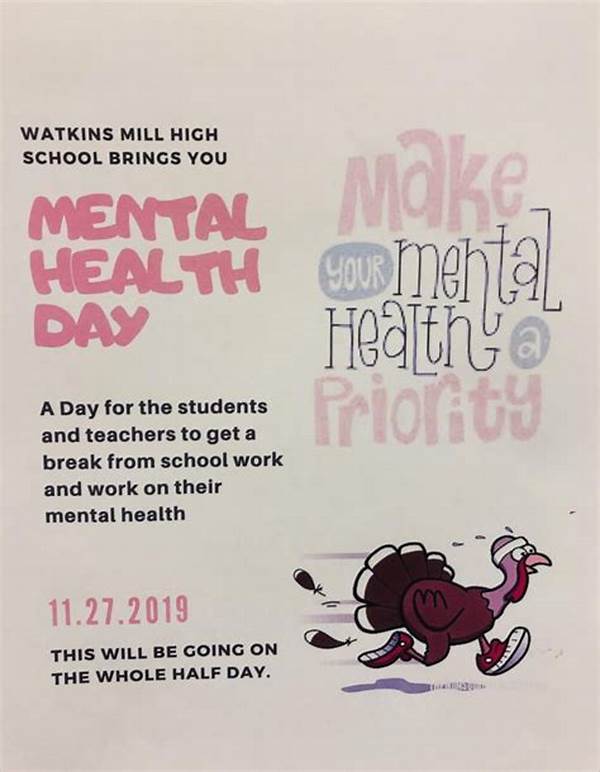When to Take a Mental Health Day Before It’s Too Late
In the hustle and bustle of modern life, mental health is an aspect often overlooked until it manifests in debilitating ways. Often, the signs of mental exhaustion creep in subtly, unnoticed until they culminate in overwhelming stress or burnout. So, when should you take a mental health day before it’s too late? Prioritizing your wellness can significantly boost productivity, improve your mood, and enhance the overall quality of your life.
Read More : Burnout And Creativity: The Surprising Link Between Exhaustion And Loss Of Idea Generation!
Here’s a relatable scenario: you’re chasing deadlines, your email inbox is overflowing, personal commitments are piling up, and suddenly you find yourself spiraling into stress. It’s like being stuck in a pressure cooker without a release valve. Others may suggest “just push through it,” but research indicates that taking a mental health day can rejuvenate your mind and increase long-term efficiency. In a world where the term “burnout” is commonplace, knowing when to hit pause is crucial.
Imagine the rejuvenation of taking a day where the sole purpose is to recharge your emotional and psychological batteries. Gone is the shame of calling in sick just because your brain needs a break. In fact, being proactive about mental health can prevent the need for extended time off due to burnout. It’s not just a day off; it’s a personal investment. This article aims to delve deeper into recognizing when to take a mental health day before it’s too late, with insights that are insightful, engaging, and—dare we say—life-transforming.
In a world buzzing with constant notifications and expectations, recognizing early warning signs of mental fatigue is your lifeline. When procrastination, irritability, and lack of concentration darken your days, it’s time to consider a mental health day. Remember, proactive care can prevent the storm of emotional turmoil. Allow yourself the grace to step back when the going gets tough.
The Benefits of Timely Mental Health Days
One of the most misunderstood aspects of mental health days is their purpose. They are not just an escape from responsibilities but a strategic withdrawal to build resilience. Research indicates that taking regular breaks can improve focus and creativity. The therapeutic effect of a well-timed break can offer a new perspective, igniting the spark of joy in your routine life.
—
Mental Health Day: A Necessity, Not a Luxury
Mental health days may often be mistaken for indulgence, but in reality, they are essential. When work stress becomes a constant companion and anxiety is your morning coffee, it’s an alarm. These days are not meant for guilt-tripping or justifying; they are a testimony to your commitment to well-being.
Recognizing the Signs Early
Tuning into your mental health is not always about grand gestures. It begins with recognizing small shifts in your emotional state. Are you feeling mentally fatigued despite a full night’s sleep? Are you snapping at loved ones for little things? These signs indicate brewing stress and the impending need for a mental health intervention. To prevent escalation, understanding when to take a mental health day before it’s too late can act as a preventive shield against more serious mental health challenges.
The narrative around mental health needs to change from that of stigma to empowerment. When the first signs of mental strain appear, it’s a call to action. Embrace the idea that mental wellness days are as vital as routine physical check-ups. They symbolize self-respect and a proactive approach to maintaining balance.
In today’s world, owning your mental state is a strength, not a weakness. Acknowledging the need for a break isn’t admitting defeat; it’s asserting control over your mental territory. Take charge today and make mental health days a regular part of your wellness strategy.
—
10 Signs You Need a Mental Health Day Now
Strategies for an Effective Mental Health Day
With busy schedules, carving out a mental health day can seem daunting. However, planning can make it feasible. Design your day with activities that promote relaxation and joy. Whether it’s a long walk, a creative hobby, or simply a digital detox, prioritize activities that recharge your spirit.
When you recognize the need for a mental health day, execute it without guilt. Treat it as a service to yourself—address the root of stress rather than masking symptoms. Remember, true productivity stems from a well-rested mind, and knowing when to take a mental health day before it’s too late is pivotal for sustained well-being.
